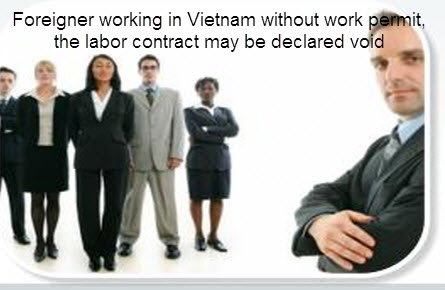Court case commentary: foreigner working in Vietnam without work permit, the labor contract may be declared void
Court case commentary: foreigner working in Vietnam without work permit, the labor contract may be declared void by Vietnamese courts
Post date: 05-07-2014
8,124 view(s)
We take a look at a court case commentary on cassation decision of Judges’ Council of the Supreme Court, case No.02/LD-GDT: TAE MAN SONG V. HUYNDAI VINASHIN.

Foreigner working in Vietnam without work permit, the labor contract may be declared void by Vietnamese courts
Facts of court case commentary
This is an cassation procedure in 2006, in which the Chief Justice of the People’s Supreme Court, supported by the Chief Procurator of the People’s Supreme Procuracy, lodged an appeal against a judgment of the Court of Appeal of the People’s Supreme Court which upheld a judgment of the trial labor court of Khanh Hoa Province as serious law violations in the settlement of cases are detected.
Two parties in this case are Mr. TAE MAN SONG (Mr.Song), a Korean nationality born in 1948, the Plaintiff, and his employer, Huyndai Vinashin (H-V), a joint venture shipyard in Khanh Hoa province, the Defendant. Mr. Song was employed by H-V as a ship captain in Vietnam pursuant to the six consecutive one year contracts from 11 March 1999 to 10 March 2005. A material fact in this case in that while Mr. Song was employed by Huyndai Vinashin for six years; he had only a work permit as required by Vietnamese law for foreigners working in Vietnam for one year from 11 March 2001 to 10 March 2002. He therefore worked for H-V without work permit during the period from 11 March 2004 to 10 March 2005 when the dispute occurred.
The incident that rose to the dispute taken place on 27 April 2004 when H-V instructed Mr. Song to tow a ship and a floating oil rig to a particular dock for repair. Mr.Song failed to carry out such instruction abandoned his job. Two date later, on 29 April 2004, H-V issued a notice to terminate the labor contract with Mr.Song immediately alleging a breach of contract by him. Indeed, Article 9 of his labor contract provided that the employer, V-H, was entitled to terminate the contract if the employee, Mr.Song, failed to carry out instructions.
On 1 December, 2004, Mr. Song initiated a lawsuit in the People’s Court of Khanh Hoa province, claiming against H-V for its allegedly unlawful termination of his labor contract because H-V did not give sufficient notice required under Labor Codes. He claimed the compensation including his salary for the remaining duration of the contract and two months’ salary according to Article 41 of Labor Codes in cases where the Employer unlawfully terminates the labor contract. This claim was denied by H-V which also counterclaim against Mr.Song for the damage it had allegedly suffered due to Mr. Song’s failure to carry out instructions.
In May 2005, the Trail Court, being the provincial People’s Court of Khanh Hoa, found that the relevant labor contract between Mr.Song and HV was totally void due to the fact that Mr.Song did not have a work permit as required by law. Nevertheless, the court ordered H-V to pay Mr.Song his salary for the remaining duration of the labor contract plus two months’ salary as required by Article 41 of Labor Code. The court also rejected the counterclaim by H-V for the damage it had allegedly suffered due to the alleged breach of contract by Mr.Song.
Both parties appealed to the Court of Appeal. On 8 June 2005, the Court of Appeal handed down its decision, affirming the decision of the trial court in favor of Mr.Song and even increased his compensation.
Following some complaints by the General Director of H-V, the Chief Justice of the People’s Supreme Court, supported by the Procurator of the People’s Supreme Procuracy, lodged an appeal to the Judges’ Council of the Supreme Court against the judgments of both the trial and the Court of Appeal (two Courts), pleading that there had been a serious error of law and requesting that the matter be sent back for a re-trial.
The Judges’ Council of Supreme Court delivered its judgment on 4 July 2006, allowing the appeal. The Council noted that while the two Courts were correct in considering the labor contract void because Mr.Song did not have a work permit, they had been wrong in holding that H-V had unlawfully terminated such contract and awarding Mr.Song the salary for the remaining duration of the contract plus two months’ salaries under Article 41 of the Labor Code. According to the Judges’ Council, Mr.Song entitlement in this case was limited to that which was available for him under the contract up to the time he abandoned his job and did not extend to the expiry date of the contract.
Furthermore, the Judges’ Council pointed out that two Courts had been wrong in dismissing the counterclaim by H-V because there was some evidence that it had actually suffered damage due to the failure by Mr.Song to carry out instructions. Such evidence had not been given sufficient consideration by two courts and should be re-assessed.
For these reasons, the Judges’ Council set aside the judgments of both the trial court and the Court of Appeal and ordered the People’s Court of Khanh Hoa province to arrange a new trial of the matter.
Court case commentary:
There are two points that are worth noting in this case.
First, foreigner working in Vietnam without work permit, the labor contract may be declared void. The three courts are unanimous in considering the labor contract totally void because the foreign employee, Mr.Song, did not have the work permit as required by Decree 105/2003 for foreigners working in Vietnam. Mr. Song committed a breach of Vietnamese law by working under a labor contract without a work permit. Therefore, the contract should be declared void. Employees should be careful to ensure that they comply with all relevant Vietnamese law, lest their contract may become unenforceable.
The second point worth noting in this case is the decision by the Judges’ Council that even if the labor contract is considered void, an employee can claim under the contract up to the time he ceases employment. In other words, the employee is still paid according to the terms of the contract for the work that he has performed. The risk for employee in such a case is that the employer may terminate the contract any time without incurring any liability for unlawful termination under labor code, which would have been triggered if the contract were valid.
In summary, two messages can be gleaned from this case. First for employees, they should make sure that relevant requirements of Vietnamese labor law relating to work permit be comply with to avoid the contract being declaring void. Secondly, for employers, the fact that the labor contract is void does not release the employer from paying the employee for the work he performed.
Lawyervn.net














Send your comment